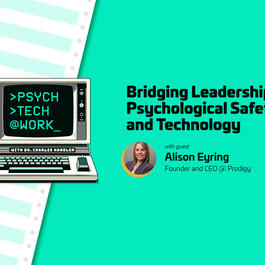
Bridging Leadership, Psychological Safety, and Technology with Alison Eyring
“Technology should enable human connection, not replace it.” —Alison Eyring Introduction In this episode, I’m joined by my friend Alison Eyring, an IO psychologist with decades of experience in the realm of global leadership and talent development and the founder of Produgie. I have known Alison for a very long time - in fact she was my first “real world” project sponsor back in 1994! It was a pleasure to welcome Alison to the show for a great conversation about the role of human centered design when building software to help leaders do their thing! Summary: Our conversation explores the intersection of leadership psychology and technology design. Alison shares insights on how psychological safety can be both measured and improved, emphasizing its critical role in team dynamics and organizational success. We dive into her approach to developing tools tailored to user needs, the importance of cultural agility for global leaders, and how technology can both enhance and challenge workplace trust. Throughout, Alison highlights how organizations can foster meaningful change through a combination of data, design, and human connection. Key Topics Covered: * The psychology behind software usability and human-centered design. * Measuring and improving psychological safety within teams. * The evolving role of AI in leadership and organizational development. * Using adaptive tools to support leaders in achieving greater impact. * The challenges and opportunities of cultural agility in a globalized workforce. Takeaways: * Psychological Safety: Leaders can actively improve psychological safety, a critical element for team effectiveness and engagement, by fostering trust and transparency. * Cultural Agility: Leadership in a global context requires a combination of self-awareness, competencies, and experiences to navigate cultural differences effectively. * Data-Driven Insights: Organizations can gain actionable insights from assessments and development tools to better understand leadership strengths and weaknesses. * Human-Centered Design: Building technology for HR or leadership should prioritize the user’s challenges and needs, not just the buyer’s demands. * AI in Leadership: AI can support leaders in providing feedback, fostering growth, and driving measurable outcomes, but its use must be transparent and human-supervised. Take It or Leave It Articles: * “The Homework Apocalypse” by Ethan Mollick * Summary: This article discusses how educators are grappling with AI tools used by students for coursework and the need to rethink educational approaches. Alison critiques the rapid pace of AI developments and emphasizes the importance of teaching judgment and understanding bias in AI-generated insights. * “Psychological Safety in the Workplace” * Summary: This article explores what psychological safety is, what erodes it, and how organizations can foster it. Alison highlights the timeless nature of this topic and its centrality to leadership and organizational success. This is a public episode. If you would like to discuss this with other subscribers or get access to bonus episodes, visit charleshandler.substack.com
From "Psych Tech @ Work"


Comments
Add comment Feedback